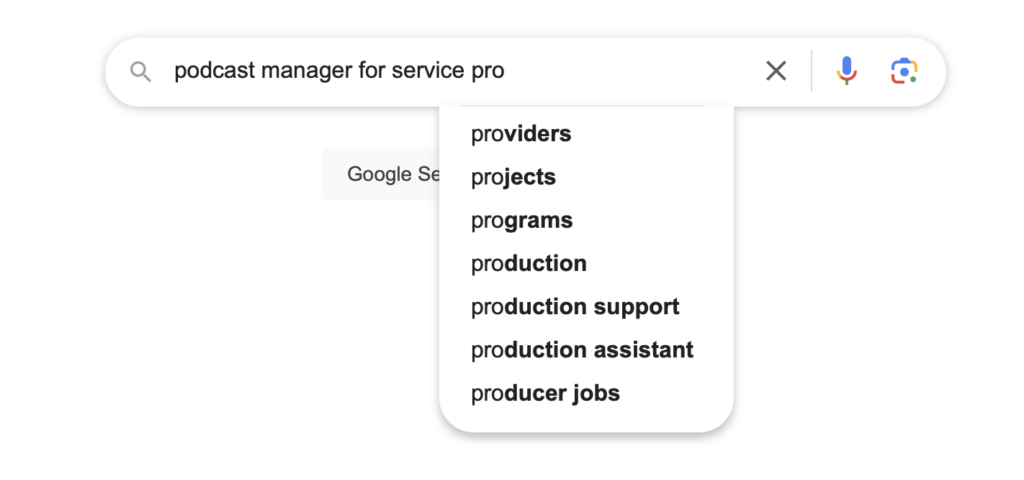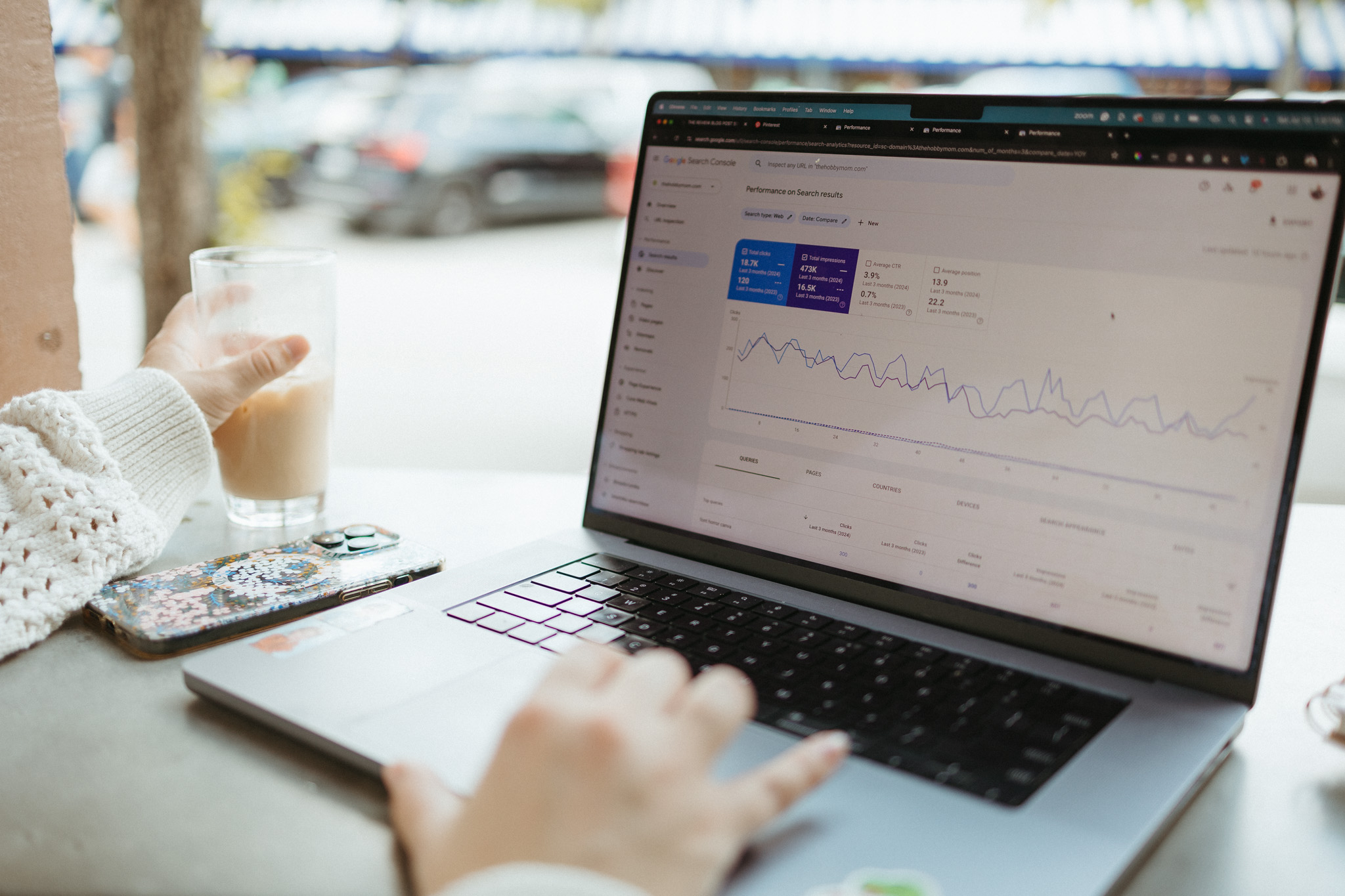I have a love for words and a knack for SEO – and as a mama, I know just how challenging it can be to run a business while raising a family. This blog is just one of the many resources you’ll find here that’ll help you boost your online visibility without sacrificing your sanity.
Thanks for being here (and I hope you’ll stick around).
Mckayla
categories
blogging
seo
Business
free seo checklist
get your checklist
explore
case studies
to the shop
work with us
follow us on instagram
share
Get access to six simple things you can do in 15-minutes or less to improve your SEO and get your website (and content) to show up in search.
I feel like we haven’t really covered SEO yet—we haven’t had that in-depth conversation about what search engine optimization (SEO) is, why it matters, or how it works (aka how it helps you show up on Google and other search engines).
So, that’s what we’re here today. I’m sharing everything you need to know to grasp the basics of SEO—let’s call this day one of our SEO 101 class, where we’re covering the must-know essentials like “What is SEO?” and “Why do I even care if Google can find me?”
Hint: it’s less complicated than the big ole marketing gurus would have you believe, and yes, there’s space for you to rank and show up, too (so, yes, you should care).
Not a reader? You can choose to listen to this episode on The Blogging & SEO Show instead or keep scrolling for all the goodness:
What is SEO?
Let’s start at the beginning: SEO stands for search engine optimization. Optimization means to refine or “make better.” Put it together, and SEO means (or works to) optimize or refine your website to help it be discovered and ranked (show up in search results) on search engines like Google.
When people (your dreamiest clients in this case) type something in the Google search bar (search queries—your keywords), SEO is what determines the results. It determines which website or webpage shows up in the top spot, what appears in the search snippet, and if and where your website (or anyone’s website) will show up on the results page.
There are multiple aspects of SEO that come to create a bigger picture, there’s:
- On-Page SEO: This takes into consideration your website copy, image optimization, page titles, meta descriptions, etc.
- Technical SEO: How your website does or doesn’t function, if it’s mobile friendly, easy to navigate, and how long it takes to load.
- Off Page SEO: This is how other websites (random websites, social media, other search engines) interact with and backlink to your website.
- Local SEO: How you’re using your website to connect with people and keywords in a specific area or location.
- Content SEO: Aka blogging, portfolios, turning your podcasts or YouTube videos into blog posts.
How Search Engines Determine Where to Place You in Search
AKA how does Google determine where you belong in their search results after someone Google’s something? What does Google actually look at when it determines how SEO-friendly or “optimized” your website is?
When you optimize your website for search engines, you’re aiming for the end result more than a specific strategy (each strategy is going to be unique to the brand or business, which is why SEO Audits + Optimizations exist).
Google (as I’ll continue to refer to, but you can replace it with nearly any search engine in this context) is looking at a few things:
- What your website is about and who it’s for
- What your web pages (and blog posts) are about and who they’re for
- Who you are as a brand/business and who you serve
- How visitors interact and engage with your website
- If your website is up to modern-day standards and expectations
- How closely you match search queries and search intent (what people are searching and what they hope to get out of searching for it)
- What happens after they click through to your website
- How other websites and platforms interact with your brand and website
The more people spend time on, engage with, and even share your website, the better your SEO will be and the better chance you have of ranking top 10 (or even #1) on Google.
Let’s Put it Into Action and Look at Some SEO Examples, ‘kay?

Saying it and seeing it (or reading it) are two different things—so yes, you’ve probably got a good handle on this whole “what is SEO” thing at the moment, but I don’t want to just leave it there. I want you to see exactly what SEO does and apply it to a real life situation (or a real life example):
Imagine you’re a podcast manager and you really want to start bringing more people into your space, but investing more time into b-rolls or going viral just ain’t cuttin’ it at the moment. So, you start thinking: What if I use Google?
Example #1: The Podcast Manager
Your first step is Googling “Podcast manager” and seeing if you show up (you don’t, and if you do, you’re closer to page 100 than page 1). But, you specifically want to work with service providers, so you do another quick Google for “Podcast manager for service providers.” Yes, it’s direct, but that’s why it works for this example—but, you get the same results, aka you’re not there.
Luckily, you’re not limited to just what you do and who you do it for (which you can rank for, but not until you implement a damn good strategy); SEO is used to connect and meet with your people wherever they are in their journey, from barely scratching the surface of your existance to being deep into DIY and almost at the point of just wanting to hand it off (this is where blogging comes in handy).
For our podcast manager, this means they could aim to show up in search results for:
- How to start a podcast
- How to edit a podcast episode
- Best way to monetize a podcast
- Can I book clients from a podcast
All things that their dream clients are looking for (aka searching for on Google) that they, as a podcast manager, can optimize their website or content for to show up in search results.
Search engine optimization is how the podcast manager is going to get their website to show up—although, they should probably focus on these six simple things to get started.
What Does Blogging Have to Do With SEO?
Blogging is how you’ll expand your ranking to new keywords (and new people). Think of it this way, a standard website has an average of five pages. That’s FIVE pages to try and rank on Google—a bit hard to try and compete with the millions of other websites, don’t you think?
But, when you blog, you have nearly unlimited chances to rank online. And, with a bit of strategic keyword choice and providing true value to your readers, you can outrank long-standing industry giants with just a few blog posts.
Add in the additional opportunities blogging brings to build trust, awareness, and even educate your audience about your offers, industry, and you (because people love buying from REAL people) and you have a truly impressive traffic-generating resource that’s just *chefs kiss* for your visibility.
But, you can’t dive into blogging without having a good foundation or Google ’cause Google will have a hard time figuring out where you ought to show up (if you’re wondering what you need to do before you blog, this is a good list).
Why Does SEO Matter? Why Should YOU Care?

I don’t know why people love to showcase SEO as this big ole opportunity that’s only available to agencies or businesses with seemingly unlimited budgets instead of sharing it for what it is: a tool that ANY business owner of any size can utilize to put themselves exactly where their audience and dream clients are searching for them WHEN they’re searching.
Search engine optimization presents the unique opportunity of existing for years—the average blog post ranks on Google for two years, and depending on your content and website you could rank for 10+. That’s literal YEARS of connections, community-building, and conversions from ONE webpage and from ONE traffic channel (Google and other search engines).
It doesn’t stop working and doesn’t make you disappear because you had a bad week and couldn’t record a b-roll or show up on stories, it won’t stop because you forgot to email your list this week (or this month), and it won’t stop if you decide to take three months off marketing because you need a brain break.
IIt keeps working even when you don’t—whether because you don’t want to, or you phyiscally or mentally can’t. SEO has your back.
How to Get Started With SEO (Like, Right Now)
Your first step is going to be a self-audit—not of your website, but of YOU and your brand. Ask yourself:
- Am I confident in my offers?
- Do I know who I want to work with?
- Do I know how I want to speak with them and present myself?
If you don’t know these things or you’re more in the “burn it all down” and start over stage, focus on your branding first (and yes, branding is more than just your colors and logo and it does impact your SEO).
An SEO (that’s what we pros who work on search engine optimization call ourselves, it can be quite confusing) will let you know if you need a copy or website update if you’re not sure and can actually work alongside them.
After you’ve done your little self-audit or brand reflection, it’s time to decide your plan of attack: are your DIY-ing it, getting a little help with paid resources, or ready to outsource? At this point, it’s also important to map out your budget (not just $$$, but how much time can you realistically commit to this) to help guide your strategy—and yes, no $$$ with a lot of time is an acceptable answer, just as $$$ but no time is.
While you figure out your next steps, spend some time reading through this SEO case study for an author to get a grasp about the results and timeline of SEO or listen to this episode on the Blogging & SEO show showcasing how I used blogging and SEO to captialize on affiliate marketing 😉
Ready to get started with SEO? Book your SEO Audit + Optimization here.
Reader Etiquette
© - Content and images in this blog are copyright this blog unless stated otherwise. Feel free to repost or share images for non-commercial purpose, but please make sure to link back to this website and its original post.
℗ - We do not store any information about your visit to our website other than for analytics and optimization for content and reading experience through the use of cookies.
c/o - Our site does at times contain paid advertisements, sponsored content, and/or affiliate links.
You might want to check these out too while you're at it
categories
blogging
SEO
business
It's me, hi! Your SEO bestie.
get to know me
work with us
//
services
//
case studies
//
Mom of three, lover of all things blogging, and borderline obsessive coffee drinker — I also just happen to love making complicated things simple and accessible, especially when it comes to SEO. The blog is a collection of what I've learned from years of testing, trial and error, and working with amazing clients with impactful businesses (just like yours). Blogging and SEO doesn't have to be boring — and it definitely doesn't need to be difficult.
Mckayla
get your checklist
Want to improve your website SEO in one afternoon? This free resource offers 6 actionable steps you can take in 15 minutes or less to instantly improve your SEO.



